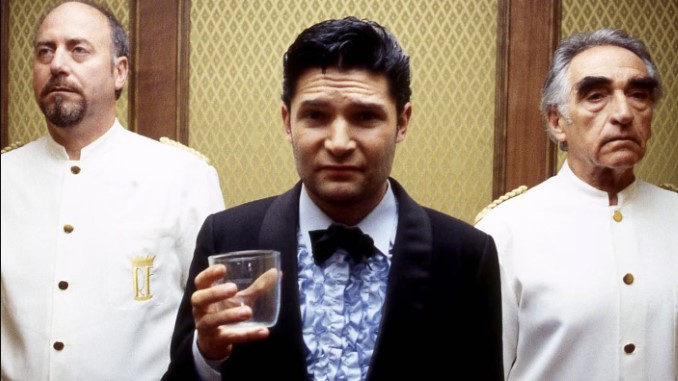Corey Feldman On His Unearthed 2004 Cult Classic-to-Be, The Birthday

Imagine that on the day of your birth, every witness present, including your own dear mother, tacitly agreed to sequester you from society and speak nothing of the matter until you turn 20. That would be a no-no. The laws of man expressly forbid that sort of thing. No such authority exists to keep the same from happening to movies, of course. For movies, timing is everything. They don’t get to choose their moments. That’s up to their authors; then, their distributors; then, and most important of all, their audiences.
Eugenio Mira’s The Birthday enjoyed its world premiere at the 36th edition of the Sitges Film Festival back in 2004. About a year later, the film debuted in North America at the 9th annual Fantasia International Film Festival, and followed that appearance up with a run at the first-ever Fantastic Fest. And after that: Bupkis. You would expect a weirdo genre picture where Corey Feldman spends the best part of two hours channeling the nervous energies of actors like John Cazale and Jerry Lewis, and where the nightmare of meeting a significant other’s haughty parents churns the gut more than the unspoken nightmare lurking in a 1980s art deco hotel, to interest a buyer at one of those three festivals. Each is friendly toward every category The Birthday can conceivably be filed under–fantasy, horror, drama, sci-fi–and each typically rewards ingenuity in craft. (Sitges in particular. Hats off for giving Vincent Price top marks for The Abominable Dr. Phibes in 1971!)
As perfectly suited as it was to its proving grounds, though, The Birthday ended 2005 sans a distribution strategy. Outside of a premiere in Spain, Mira’s home country, and a DVD release relegated only to Spain and, incongruently, Germany, the film had nowhere to go after the festival circuit; other than the crowds present for its screenings at Sitges, Fantasia, and Fantastic Fest, plus scant domestic (and German) audiences, no one had the privilege of seeing it.
These were, recall, the nascent days of digital film journalism, where fewer voices covering the movies for fewer sites didn’t possess the same access to instantaneous news and rumormongering that folks in 2024 take for granted. “The movie [premiered] in 2004,” Mira tells Paste in a recent interview. “That’s one year before YouTube, two or three years before Facebook and Twitter started to hit, before iPhones. It’s in that blind spot at the end of an era.” In that context, The Birthday’s fall from the pop culture radar was nearly inevitable, which doesn’t make it less of a shame. “When it comes to careers and perception and the possibilities of how a film ends up in a place or not, there’s this element that nobody wants to talk about, and that is luck,” Mira adds. Once again, it’s a matter of timing.
It’s a small consolation that what led to the film falling from memory isn’t simply a lack of buzz, but a lack of funding. “The production company who made this film ran out of money during production,” Mira says. “That’s one of the reasons why we had problems with not having a strategy for distributing the film beyond the run that it had around film festivals.” This explains the limited debut in Spain, and the even more limited DVD pressing, and why the version available in those formats clocked in at roughly 95 minutes–20 minutes less than Mira’s original cut, the one that played for audiences at Sitges Film Festival and Fantastic Fest this year. Better late than never, though it’s likely that by now, the recollections of a non-zero number of the people who saw The Birthday in 2004 and 2005 have faded. 20 years is a long time to go without revisiting a movie.
Feldman acknowledges the impact the passage of time has had on the film’s reputation, such as it is. “The lion’s share of our, or at least my, U.S. fan base, has never seen this film, has no idea that it even existed before a year ago,” Feldman explains. “The only time they heard of it was my obscure reference in an interview, occasionally.” Gradually, The Birthday, for all intents and purposes, ceased to exist at all, as far as it concerns the moviegoing public and even Feldman devotees; to an extent, the inconspicuousness reflects the struggles of the nebbish but sweet Norman, Feldman’s character. Try as he might, he can’t seize the attention of his girlfriend, Alison (Erica Prior), as she bustles about the posh Royal Fulton hotel greeting the guests for her father, Ron’s (Jack Taylor), birthday party. Norman is effectively invisible to Alison. To everybody else, he’s either a curiosity or a nuisance. (To Ron, he’s both.)
-

-

-

-

-

-

-

-

-

-

-

-

-

-

-

-

-

-

-

-

-

-

-

-

-

-

-

-

-

-

-

-

-

-

-

-

-

-

-

-








































